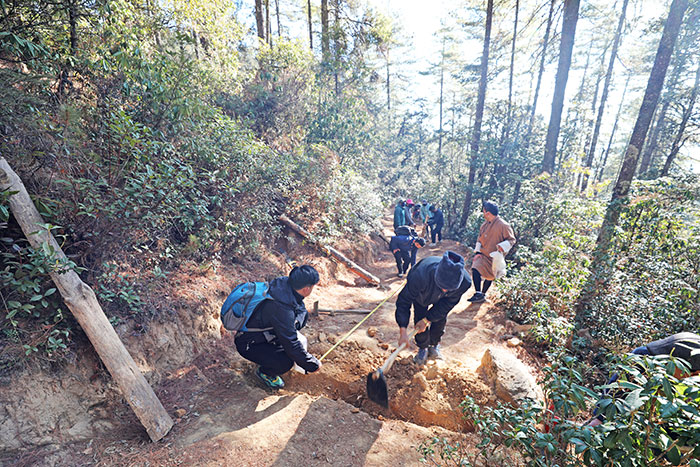Choki Wangmo
When the pandemic shut the tourism sector, Yeshey Tshering Sherpa, a full-time driver with one of the tourism companies, was rendered jobless like many in the sector. After five months of job hunting, he was finally employed in enhancing Phajoding trekking route.
Since then, the payment he received from the works has helped him sustain along with his two children in Thimphu.
Every day, he starts his journey around 7am and returns home by 4pm. He earns about Nu 15,000 a month and Nu 3,000 as food allowance. “The work is difficult but survival is more important.”
The nine-month project rolled out by the Tourism Council of Bhutan (TCB) in collaboration with the Guides Association of Bhutan (GAB) with fund from the United Nations Development Programme (UNDP) supported under UN’s Multi-Partner Trust Fund and has engaged 30 laid-off workers so far. There are three women in the group.
A mother of one and a tour guide, Chhimi Dema, who helped her parents on the farm before joining the project, said that it was difficult in the beginning but it was not impossible. “It is like a physical exercise while earning income.”
The project is expected to end next month.
Works include trail development or maintenance, construction of gazebos, resting benches, and restrooms for six days a week. The trekking route located in the periphery of Thimphu is expected to provide a getaway for residents and give a facelift to the trekking routes.
Currently, about 90 percent of the work is complete which is carried out in consultation with the Department of Culture.
Chairperson of GAB Garab Dorji said: “The project has benefitted our laid-off guides who are meaningfully engaged in Phajoding trail enhancement works. It is not only engaging but also providing them income for sustenance during such trying times.”
He said that the workers would gain meaningful experience and be proud of their contribution to the tourism sector. “GAB intends to adopt the trekking route for sustainability once it is complete.”
Other activities of the project include upskilling of laid-off people in the tourism industry, the survey of Snowman Trek for digitisation by TCB in partnership with National Land Commission, and the launch of Bhutan tourism dialogue series.
According to an official with UNDP, a total of 286 people benefitted from such interventions.
The pandemic has gravely affected the hospitality sector with about 50,000 people rendered jobless by the pandemic.
The tourism policy through ecotourism supports the protection of cultural and natural heritage; provides positive and enriching experiences for visitors and hosts; assures tangible benefits to local people; and contributes to the pillars of Gross National Happiness.
Section 7.1 (6) of the policy states that to contribute towards sustainable and inclusive development, the government shall promote ecotourism.


